VIDEO: Prohibition-Era Nightclubbing Zagreb, 33 Fined
January 29, 2021 – It has all the ingredients of a movie about Al Capone or Lucky Luciano in 1920s Chicago - illicit, hidden drinking dens, dancing girls, bullets, guns, gangsters and a police raid, only with a neon lighting scheme that remains fashionable strictly in Balkan clubs. Welcome to Prohibition-era nightclubbing Zagreb
It has all the ingredients of a movie about Al Capone (main picture) or Lucky Luciano in 1920s Chicago - illicit, hidden drinking dens, dancing girls, bullets, guns, gangsters and a police raid, only with a neon lighting scheme that remains fashionable strictly in Balkan clubs. Welcome to Prohibition-era nightclubbing Zagreb.
Croatian police have issued a video of a raid they undertook to shut down a Prohibition-era nightclubbing party in Zagreb. Inside the venue, they found 33 persons. None were wearing masks.
One young man at the party was caught with a pistol and bullets. If it weren't for the police's modern helmets with visors and the Balkan-cool neon lighting, you could be forgiven for thinking you were watching Eliot Ness and The Untouchables busting an illegal speakeasy. All cafes, restaurants, bars and nightclubs are supposed to be closed at the moment under measures adopted to counter the spread of Coronavirus.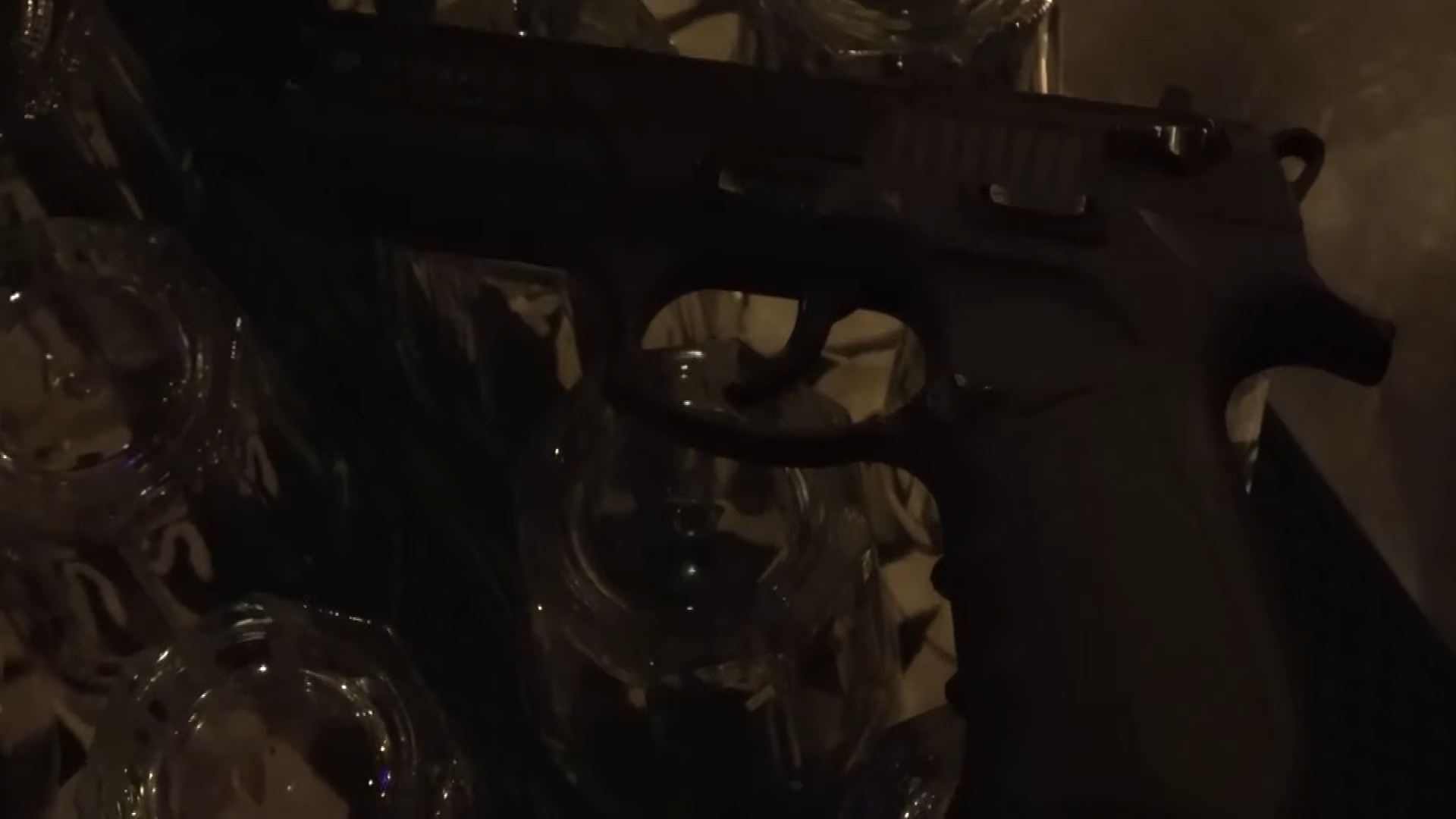 The pistol found by police while conducting a search on a 24-year-old at the club - Youtube screenshot
The pistol found by police while conducting a search on a 24-year-old at the club - Youtube screenshot
In the original era of America's Prohibition, under which the production, import, transportation, and sale of alcoholic beverages was illegal, Al Capone ultimately received an 11-year prison sentence for tax evasion and Lucky Luciano was looking at 30 - 50 years until he struck a deal and agreed to be deported to Italy. Thankfully, there are no mafia murders connected to this tale of Prohibition-era nightclubbing in Zagreb.
In addition to the video, the police released a statement about the prohibition-era nightclubbing raid:
"During the operation, a total of 33 people were found, identified and checked in said facility. No coercive measures were used during the actions of the police officers. 33 people were found not wearing protective masks, which is why the police officers issued them three Notices of Misdemeanor and 30 fines were collected for violations of Article 47, paragraph 2, item 9 of the Law on the Protection of the Population from Infectious Diseases.
Furthermore, for one of the caught persons, a 24-year-old was searched and a gas pistol was found in his possession, for which he was issued a Mandatory Misdemeanor Order for the offence under Article 27, paragraph 2 of the Law on procurement and possession of weapons by citizens. Bullets found by the police at the prohibition-era nightclubbing scene in Zagreb
Bullets found by the police at the prohibition-era nightclubbing scene in Zagreb
Also, officials of the Directorate of Civil Protection found violations of epidemiological measures contrary to the Decision on necessary epidemiological measures restricting gatherings and introducing other necessary epidemiological measures and recommendations to prevent the transmission of Covid-19 through gatherings. Due to performing catering activities contrary to the decisions of the Civil Protection Headquarters, officials of the State Inspectorate, Tourist Inspection, Zagreb Regional Office found a violation of Article 9A of the Catering Act and issued an oral decision banning the work, and the facility was sealed for at least 30 days. Misdemeanor proceedings will be initiated against the legal and responsible person.
As part of the criminal investigation, the 45-year-old owner of a catering facility was taken to the official premises of the Zagreb Police Administration for a criminal investigation on suspicion of having committed the criminal offence of "Spreading and Transmitting an Infectious Disease" under Article 180. He will be handed over to the custody supervisor after the criminal investigation is completed”
Prohibition in the United States took place in a 13 year period between 1920 and 1933. It is highly unlikely that the bars and cafes of Zagreb will be asked to remain closed for such a length of time. This is not the first instance of Prohibition-era nightclubbing taking place irrespective of epidemiological guidelines in Zagreb. In late November 2020, Croatian media (including Juarnji List) widely reported on police raids that took place at two Zagreb venues, even though measures adopted in the fight against the pandemic were at that time more relaxed.
Franjo Tudman Face Masks A Covid-Era Hit On Social Media
January 24, 2021 – First President of Croatia makes a Covid-era comeback, as new Franjo Tudman face masks become a hit on social media
So far, the nationally specific Covid-era face masks seen on the streets of Croatia have been rather divisive. The logos of the country's bigger football clubs look good but could land you in grief if you travel to the other side of the country while wearing one. The outlawed slogans and insignia of Nazi-allied independent Croatia are a rather more gruesome reminder of the minority of fascist sympathisers that sadly linger in the village. Thankfully there are few tourists here right now to be appalled at such.
Three cheers, then, for the arrival of a distinctly Croatian covering of which the whole country can approve. Though released relatively recently, the new Franjo Tudman face masks have already proved to be a Covid-era hit on social media.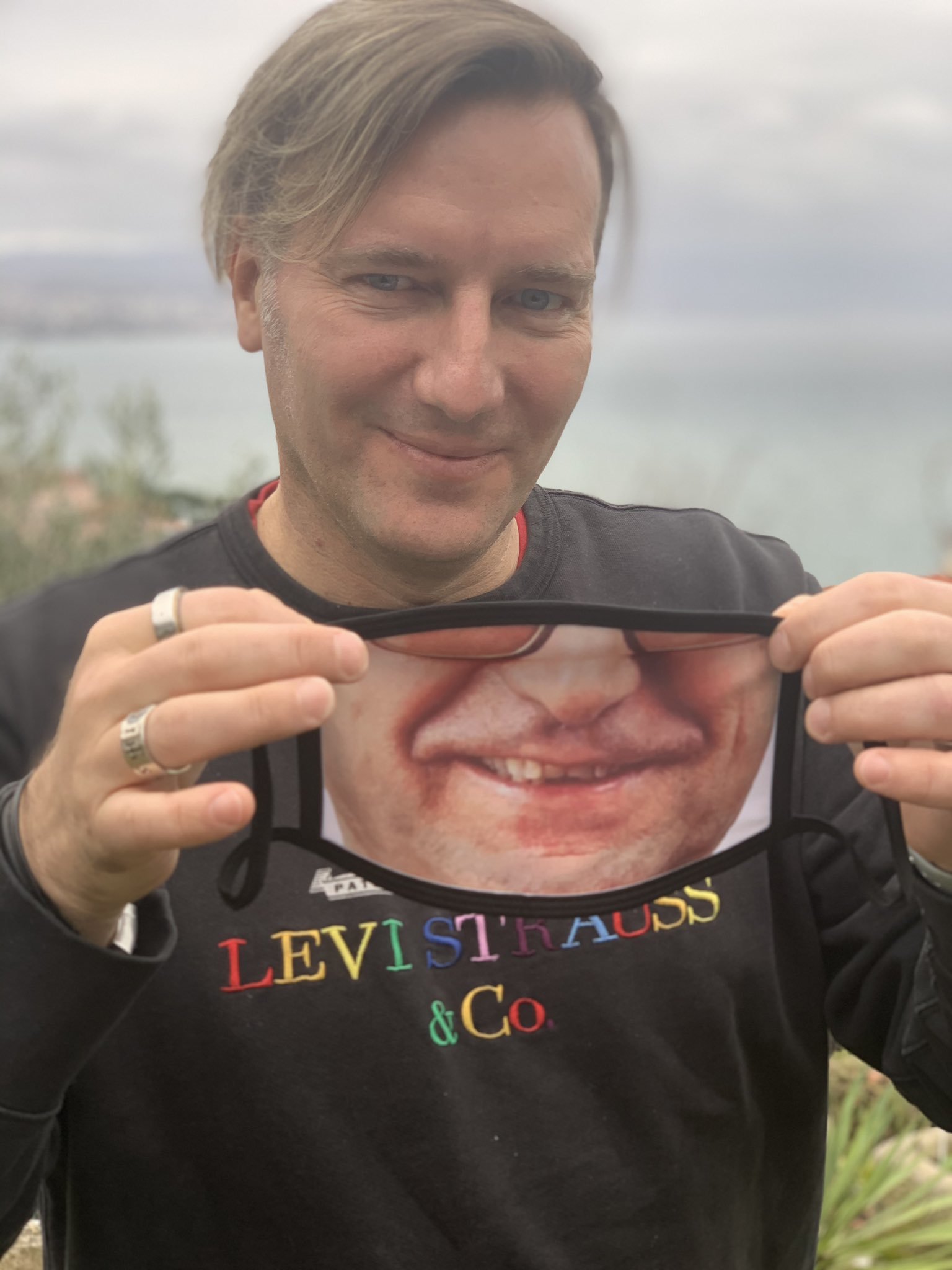
The Franjo Tudman face masks were designed by nationally recognized Rijeka singer-songwriter Dražen Turina, best known by the nickname Šajeta, which is also the name under which his music is released. Along with Pula singer Alen Vitasović and his band Gustafi, Šajeta is a key composer of contemporary Croatian music that uses the Chakavian dialect. Dražen Turina revealed the Franjo Tudman face masks on his Twitter social media account, where they became instantly popular.
Distancing himself from any misunderstanding that the Franjo Tudman face masks had been inspired by sentiments of nationalism, Šajeta instead playfully bemoaned the wearing of masks by young Croats that feature the images of foreign figures. He said he deliberately choose a photo of the former Croatian president smiling for the Franjo Tudman face masks.
It is not yet clear if Šajeta plans to make the Franjo Tudman face masks widely available. Followers of the singer on Twitter were keen to ask if he would be making other masks featuring nationally famous figures.
The Franjo Tudman face masks are far from the first tributes to be paid to the first President of Croatia. There are more statues dedicated to Franjo Tudman in Croatia than any other person. Following Croatia's independence from Yugoslavia, Franjo Tudman became the first President of Croatia and served in the position from 1990 until his death in 1999.
All images from the Twitter account of Šajeta
45 People With Fake PCR Tests Detained At Croatian Border In One Weekend
January 19, 2021 – 45 people tried to enter Croatia with fake PCR tests this weekend alone. They were caught by Croatian police, detained at the border and reported to the State's Attorney office. If found guilty, each faces a maximum penalty of three years in prison
Some 45 people tried to enter Croatia through the borders of one county with fake PCR tests this past weekend.
Travel from Bosnia and Herzegovina into Croatia currently requires the production of a negative PCR test or a doctor's certificate proving you have successfully passed through a COVID-19 infection in recent months.
Since the ban on entering Croatia from Bosnia and Herzegovina without a negative PCR test was introduced, fake PCR tests are increasingly being forged. Border police and customs officers at crossings in Brod-Posavina County have met many people trying to cross the border with fake PCR tests. But, this weekend a new record number of forged tests were found on the county's border crossings.
According to a statement from the Brod-Posavina Police Department, as many as 45 attempts to enter the country with fake PCR tests were discovered on Saturday and Sunday.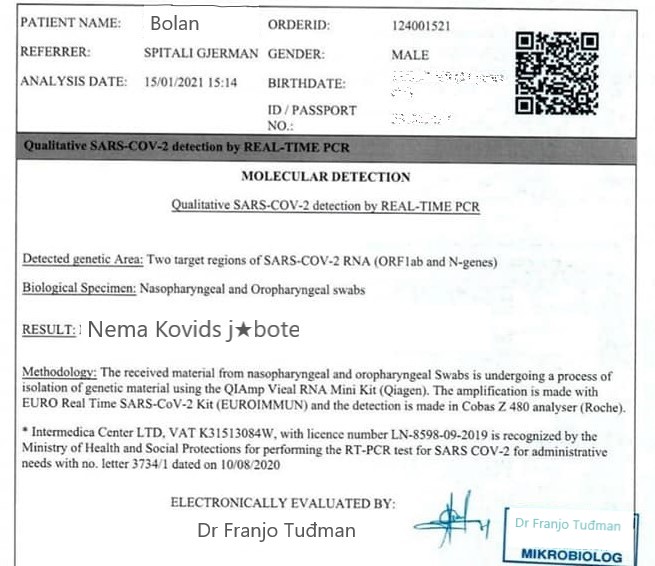
"At the Stara Gradiška border crossing, police officers determined that 43 persons, mostly citizens of Bosnia and Herzegovina, presented fake PCR tests issued in BiH at the border control. At the Slavonski Brod border crossing, two people were registered who gave forged tests," the Brod-Posavina police reported.
Police officers file criminal charges against all those suspected of committing the criminal offence of forgery of a document with the Municipal State Attorney's Office in Slavonski Brod. If found guilty, such persons face up to three years in prison.
The overall number of people detained on Croatia's border with fake PCR tests this weekend could actually be higher - the figures of 45 persons detained with fake PCR tests were released by the police of just one county in Croatia - Brod-Posavina County. A further eight Croatian counties exist along the border with Bosnia and Herzegovina. Each has border crossings between the two countries.
Students in Croatia Likely to Return to School on January 18
January 9, 2021 - Students in Croatia should return to classrooms on January 18, said the Ministry of Science and the City Education Office.
Jutarnji List reports that classes in Croatia, except those affected by the earthquake-affected Sisak-Moslavina County, should likely resume in schools on January 18, and the first day of classes in Zagreb schools should begin with evacuation exercises, revealed the Ministry of Science and City Education Office.
Over the next week, all counties should make decisions on teaching, and citing the favorable epidemiological situation related to COVID-19, Radovan Fuchs' ministry expects that the counties will mostly adhere to the A model of teaching. Namely, according to the MZO database of infected students, in the week before the holidays, from December 14 to 20, there were 2657 infected, and from January 1 to 7, the number dropped to 507 0.11 percent of students.
In the last week, Primorje-Gorski Kotar County recorded 76 COVID-positive schoolchildren (0.27 percent), Split-Dalmatia County 0.17 percent (93), Zagreb County 0.10 percent (31 students), and the City of Zagreb, if the data is to be believed, dropped to 108 positives, or 0.11 percent of students.
“We sincerely hope that the trend with small numbers of infected students will continue so that we can start the second semester with as many children in schools as possible,” said the advisor to the Minister of Education Božo Pavičin.
According to the confirmation of the head of the Zagreb Education Office, Ivica Lovrić, consultations with the Ministry on teaching began yesterday and will continue on Monday. In Zagreb, the earthquake is a priority, i.e., the safety of students in school buildings, which is why COVID fell into the background.
Parent associations and individuals ask questions about children's safety in old buildings, advocating for online teaching. Some school principals say the smaller cracks in buildings from the March earthquake have now widened and need to be repaired, even if such damage does not affect the facility’s functionality.
“Our school is certainly in better condition than before the earthquake in March because reinforcements were placed during the reconstruction. Therefore, the building is fortified, and whether it is safe, I really cannot claim. It is important to carry out evacuation exercises with students, adapted to each school building,” says Tihomir Engelsfeld, director of a Zagreb grammar school, whose building was badly damaged in March. The Petrinja earthquake on December 28 also caused a slight crack in the plaster.
The City Education Office says parents' fear is understandable but reiterates that most of the school buildings damaged in the March earthquake were well repaired.
In the event of a final decision to start teaching according to the A model, the City Office will appeal to teachers and school professional services to continue thematically on the first day.
“All schools will have an obligation to conduct evacuation exercises for all students on the first day of school,” says the head of the Zagreb Education Office, Ivica Lovrić.
In Sisak-Moslavina County, the online model is the most promising, combined with a mixed form of teaching.
Yesterday, the Ministry of Education sent an online questionnaire to the county education office for school principals in Banija to find out how many students do not currently live in their home, how many intend to return, the needs for textbooks and tablets, and how many students and teachers are without access to electricity and internet.
The president of the Association of Principals of Croatian Secondary Schools, Suzana Hitrec, hopes that the second semester will start with normal classes, except, of course, in schools affected by the earthquake.
“Now, it is important for us to conduct quality evacuation exercises in schools and to organize professional services for providing psychological assistance. The students have been stressed by COVID so far, and now by the earthquake. It is necessary to make them aware of what to do in case of an earthquake and not panic. Now we are all more sensitive than we have ever been before,” says Suzana Hitrec.
To read more about COVID-19 in Croatia, follow TCN's dedicated page.
What Kind of Life Awaits Croatian Anti-Vaxxers Who Refuse Vaccination?
December 29, 2020 – The arrival of COVID-19 vaccines in Croatia has been met with much relief by many people. But, not everyone is happy. Conspiracy theorists - those who favour disreputable sources and 'whispers on the wind' to real science - are reticent, some even angry. So, what kind of life awaits Croatian anti-vaxxers who refuse to take the vaccine?
The people who inhabit the lands now known as Croatia have a long history of being pushed around. For this, they cannot be blamed. Greatly outnumbered by the occupying armies of some of the most powerful empires of all time - the Romans, Venetians, Austro-Hungarians and Ottomans - their rebellions against such overlords have been relatively small in number. Their default setting has been to visit the kafana at the end of the day and moan, grumble, gossip - perhaps even plot - against those who make their lives disagreeable.
Croatia was finally freed of its last imposing masters over two decades ago. But, true to form, the grumbling in the kafanas has continued. Except, now that the kafanas are all closed in response to Coronavirus, the moaning has moved almost exclusively to the internet. And, it has reached a shrieking pitch.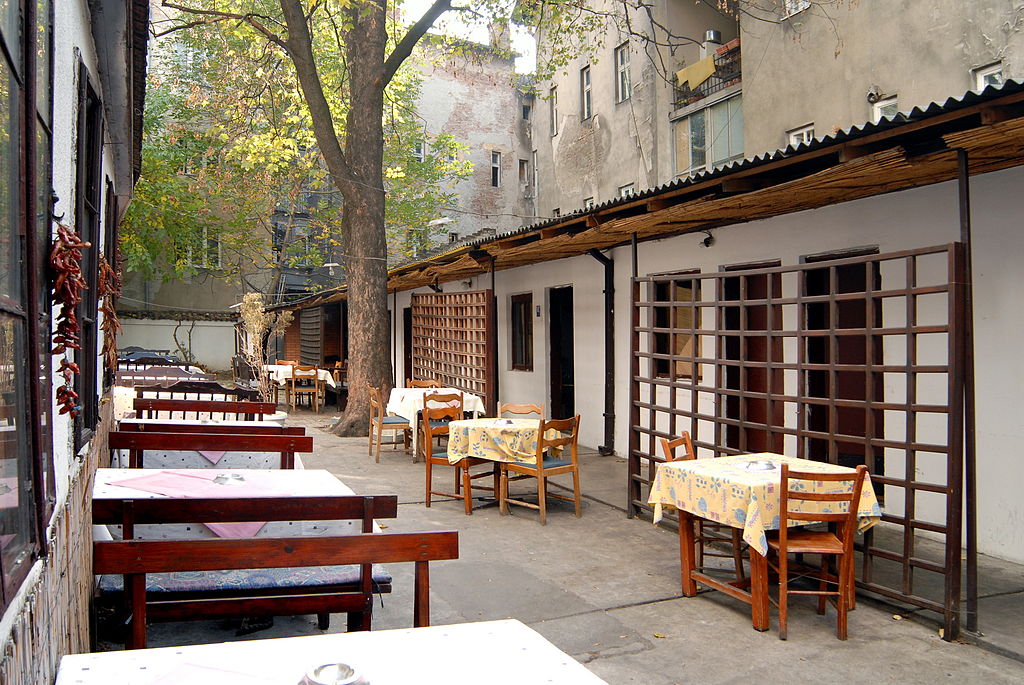
The arrival of COVID-19 vaccines in Croatia has been met with much relief by many Croatians. The news of the first vaccinated citizen, followed by the first vaccinated healthcare workers, was also well received. You can tell this from the overwhelmingly large amount of 'likes' such news generates when posted to social media. These warm welcomers of good news in Croatia could be best described as the silent majority. And, in the same way most Croatians lay subdued for lifetimes under bullying empires, this silent, sensible majority is drowned out by the deafening vitriol of the unhinged within the comments sections underneath.
These arch-moaners appear in the comments on most issues, railing against the increasingly modern ways of the world. On the issue of Coronavirus and the incoming vaccines, it is the Croatian anti-vaxxers who are angrily dominating the discourse.
It appears near pointless to debate with them. They are not ones for science, facts nor reasonable debate. Not for them are the reports of scientific journals, the BBC, The New York Times, The Guardian, Al Jazeera, or The Washington Post. Instead, they cite the most spurious of sources – a website nobody else has heard of, a document written by a friendless doctor from the Texas farming community who has a curiously photoshopped profile picture, a Youtube video made for the same price as a hamburger and narrated by a 17-year-old from the outside toilet. There's no point telling them that the vaccines coming onto the market were actually designed back on January 13, just two days after the Coronavirus genetic sequence had been made public and that it has taken until now to produce them, due to stringent testing on their safety. No. Because for Croatian anti-vaxxers, whispers on the wind, the horoscopes, crystal ball of the fortune-teller and the inescapable stare of Braco are just as reliable - if they're telling you what you want to believe. For whichever lunatic theory you want to adopt, you can look online and you'll be sure to find some crackpot to back it up. The internet is the great leveller for Croatian anti-vaxxers as well as everywhere else - a place where deposed Nigerian royalty who want to put money in your bank account have just as much credence as an 80-year-old media title with a blemishless reputation.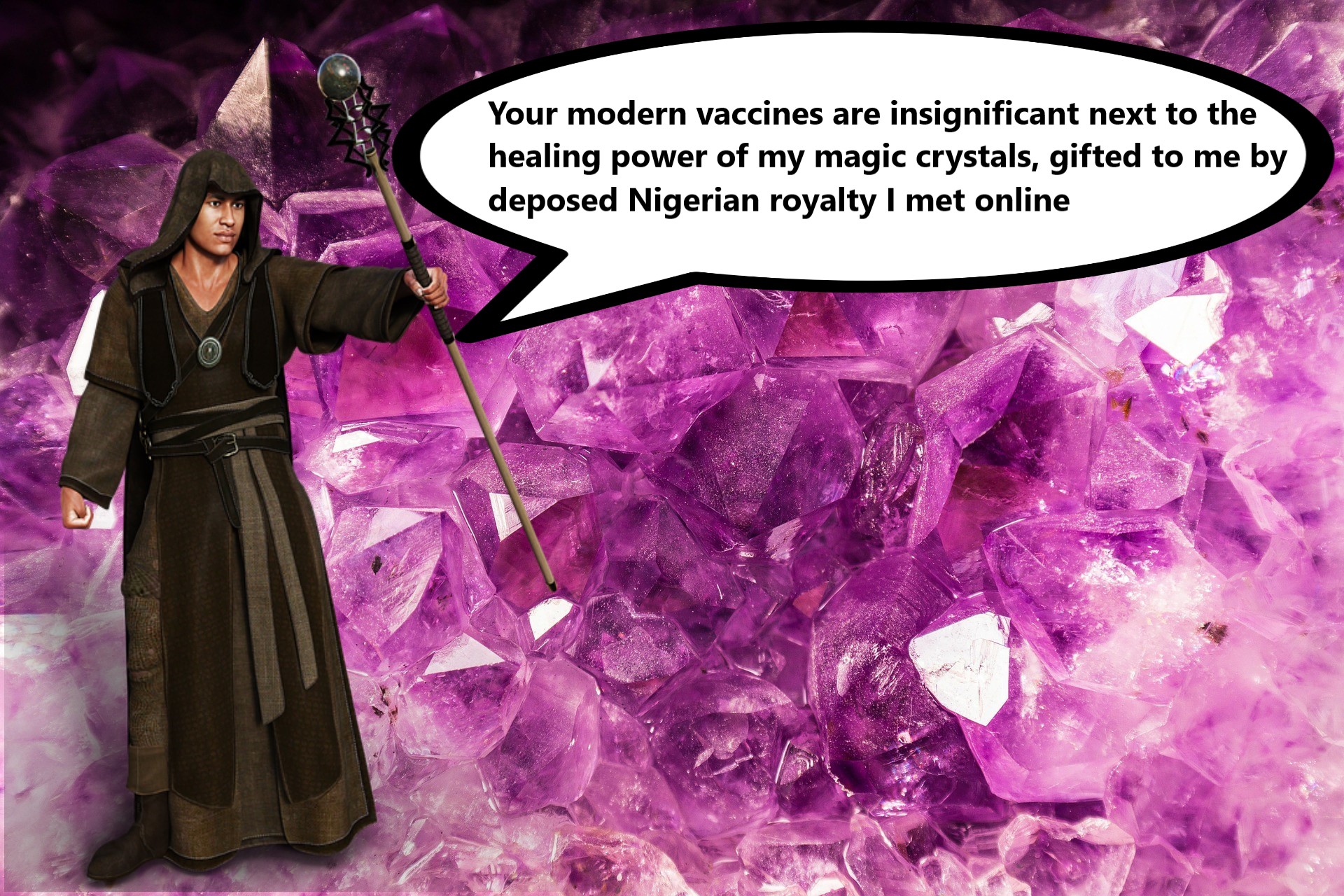
Of course, while life is too short to even debate with anti-vaxxers in Croatia or anywhere else, that's not to say they are undeserving of sympathy. In our recent interview with a doctor working on the Coronavirus frontline in a Croatian hospital, they generously raised an interesting defence of the tin-foil hat brigade - “It's not always the content of the conspiracy theory that appeals to these people as much as it is their inability to accept facts – the truth – because they have little faith in the authorities that are telling them.”
Finding fault in authorities is far from unique to Croatia. Yes, there is a certain amount of kafana moaning and grumbling all over the world, and often for good reason. Politicians are more than aware of this. And, in an era of widespread voter apathy and low voter turnout, where yet another silent majority has the potential so easily to change the names of those who govern, this is exactly why politicians will abstain from making the Coronavirus vaccines mandatory. With things as they currently stand, it is near inconceivable that Coronavirus vaccines will be made compulsory in Croatia or in any other western democracy. Good news for Croatian anti-vaxxers? Well, not quite, because it is highly likely that the private sector will be among the greatest of persuaders for vaccination. It is not unthinkable that we are about to enter a wholly new two-tiered society – the vaccinated and the unvaccinated. And signs of what that life might look like for Croatian anti-vaxxers are not good. They are not good at all.
“Vaccination could become one of the measures that would make it possible to come to events,” Stefan Breitenmoser, general manager of the Professional Association of Swiss Organizers of Concerts, Events and Festivals, told Sonntags Blick in the past week. In Switzerland, vaccination began on Wednesday and it is free. It is not only the entertainment events industry that is considering the measure - the Swiss Football League similarly said it is giving it serious consideration. Professional sports and the events industry have lost billions during the pandemic. The 2021 Olympics hangs on a knife-edge in regards to accepting audiences into its stadiums – it has already been delayed by a year. It is highly conceivable that access to all large events in future will be dependent on proof of vaccination. The National Stadium in Japan was due to host some of the key events of the 2020 Summer Olympics. The whole event has been delayed until summer 2021, in response to the pandemic © Arne Müseler
The National Stadium in Japan was due to host some of the key events of the 2020 Summer Olympics. The whole event has been delayed until summer 2021, in response to the pandemic © Arne Müseler
In an interview on N1 television in Croatia over recent days, epidemiologist Branko Kolarić - a member of the Scientific Council of the Government of the Republic of Croatia - echoed similar thinking. He stated that a list of the vaccinated will be carefully maintained, most likely through some kind of e-documents, and although vaccination will not be mandatory, vaccination will bring some benefits - such as air travel, group gatherings and attendance of concerts and festivals. You are surely not going to see police or soldiers checking your vaccination status at the entry to a dance music festival in Dalmatia. But, it is highly likely that event organisers will insist on proof of vaccination before granting entry. Even if they don't wish to, it is more than conceivable that they would not be granted the necessary licenses nor insurance without assuming such a position.
Another industry that has lost billions in the pandemic is the travel and tourism sector. Little surprise then to have found budget airline Ryanair launching a new campaign of 'Jab and go' over the last few days. The suggestion is crystal clear – get vaccinated, you can come on our planes, we'll allow you to travel. Ryanair will certainly not be the last airline to assume responsibility for vetting passengers' vaccination status. Croatian anti-vaxxers had better be really happy to be here, because international borders may well be permanently closed for them while they remain unvaccinated.
So, a life with no spectating at big sports events, no more large concerts or music festivals and no more international travel is what seems to be just around the corner for Croatian anti-vaxxers. Sounds harsh, unpleasant. But what if it extends to libraries, schools or even hospitals? We don't yet know anything concrete about the lower tier of existence Croatian anti-vaxxers may choose to dwell in. But, it's not where I want to live. Perhaps they'll even be forced to drink exclusively in their own anti-vaxxer kafanas? For sure they'll be easy to identify – they'll be the ones from which the loudest moans are coming.
The views expressed in this article are solely those of the author and are not necessarily shared by Total Croatia News
Croatian Healthcare Workers: Christmas's Forgotten Heroes?
December 28, 2020 – Amidst the difficulties of a second lockdown, a socially distanced Christmas and yet more earthquakes, have we forgotten about Croatian healthcare workers? TCN decided to interview a doctor working on the front line of the fight against COVID
During the first lockdown, it was all about the balconies. Saxophonists, DJs, opera singers – we were entertained on social media by a string of balcony-based stunts that somehow showed resilience, community spirit, humour. Zagreb was no exception. A trend of clapping on balconies in appreciation of healthcare workers passed from country to country and was picked up in Zagreb. After the applause finished, people went back inside. Nothing much had changed. It was a nice enough gesture.
Since the start of summer, no such applause has been heard. Perhaps the release from lockdown gave the signal that the lives of Croatian healthcare workers had also become much easier? That certainly wasn't the case. Though the number of people infected with COVID has grown significantly over recent weeks, Croatian healthcare workers have been treating people sick with COVID since springtime.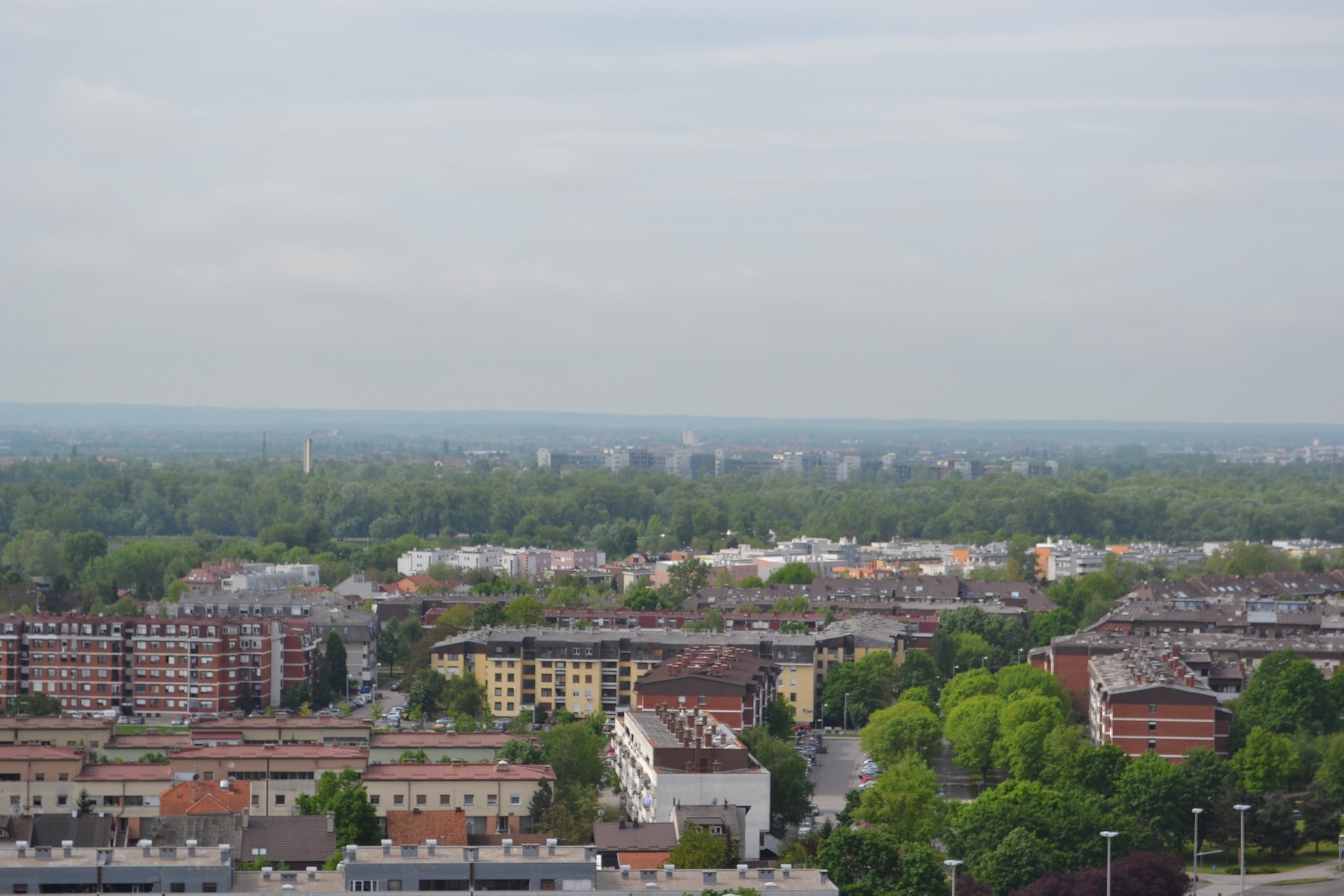
Croatian healthcare workers are currently busier with COVID patients than at any time before. And yet, there are no more trips out onto the balconies to show our appreciation for them. Perhaps it's now too cold outside? Perhaps some aren't aware how busy Croatian healthcare workers currently are with COVID patients? Are we perhaps guilty of taking Croatian healthcare workers for granted? Or, maybe we have simply put Croatian healthcare workers to the back of our minds as we struggle with our own challenges?
Throughout this year, TCN has been pleased to report many instances of generosity and innovation directed towards the fight against COVID. Certainly, not everyone in the country is guilty of forgetting about the Croatian healthcare workers who are on the front line fighting this disease. But, how much impact do these instances have on the general lives of Croatian healthcare workers? What is it like to no longer hear the nightly appreciation from our balconies? And, just what is life like as one of the many Croatian healthcare workers battling COVID in the year of the pandemic? TCN decided to interview one to find out.
The doctor we spoke with is a resident physician, working at a smaller community hospital in the continental part of Croatia. They agreed to speak with us on the condition that they do so anonymously.
Looking back at the first lockdown, we didn't know so much about COVID back then. We didn't know exactly how it was spread, the different manifestations of the disease, what course the disease took, nor what the recovery could be like. I think the government did a really good job of responding to the threat as they saw it. We had a small spike in cases, but that is minuscule to what we have now.
I think people generally did what they were told because they thought it would be temporary and they could see the sense in starving the disease out.
At the hospital, we were at first caught a little off guard with the amount of PPE we had and some other resources that we needed. For ICU and ventilators, we were well equipped.
Some of the residents were given some paid leave. It was important to put human resources into tiers. Croatian healthcare workers were certainly more predisposed to catching the disease, simply because they were around it every day.
After such great early successes, I was surprised that everything was relaxed later on to allow the tourist season to take place how it did, and for events like the Vukovar commemoration. It felt like it was a calculated risk. The lockdown we are now in is perhaps too little, too late. The disease is out there now, wild. The numbers of infected people are significantly higher.
The difficulty with this disease is that people can be infected and have very few or no symptoms at all. They might not know they are spreading the virus. You might not know you're sitting next to someone who has it.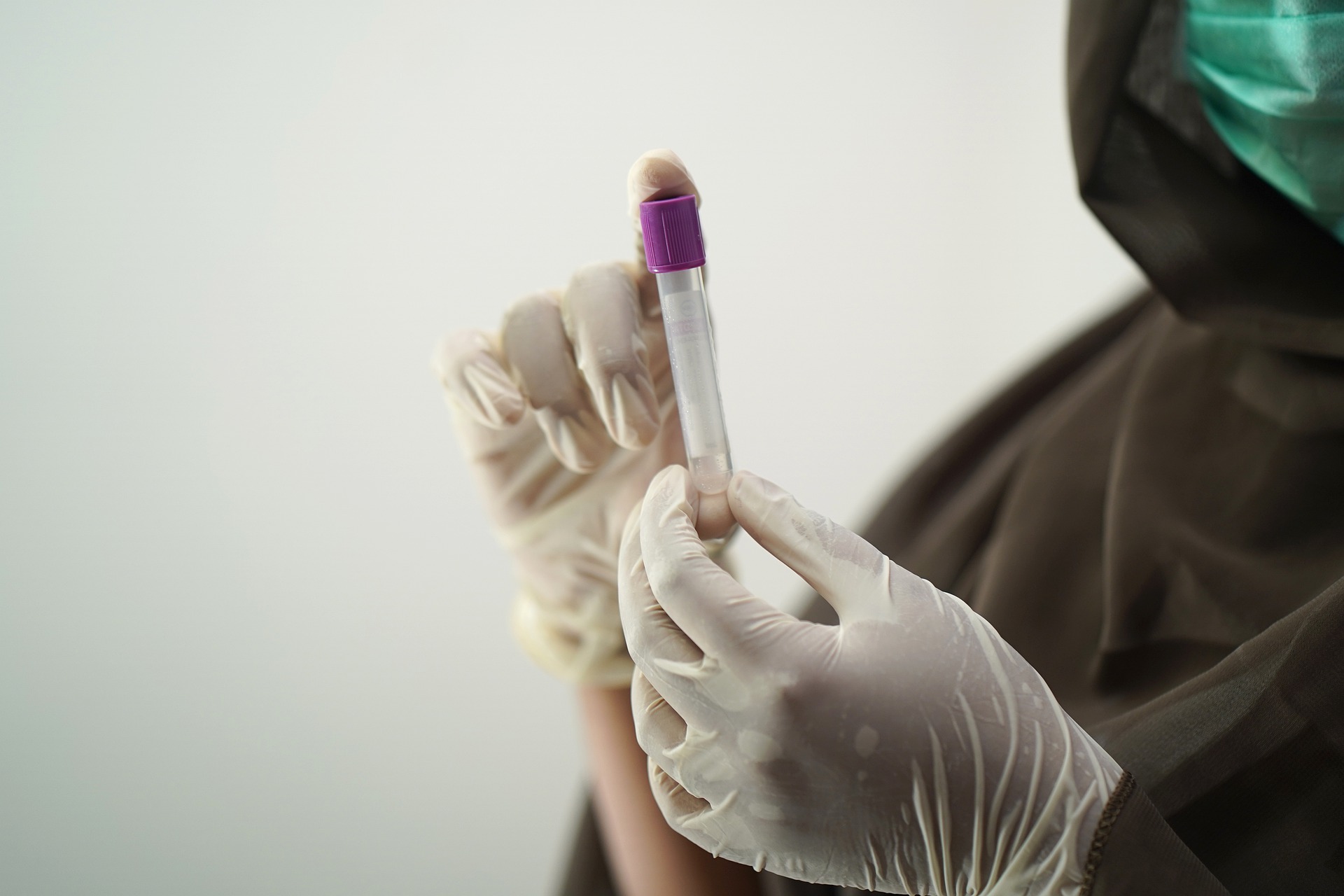
Even though we're not at the centre of care for a major population area or city, we saw cases of the disease almost immediately. Our community hospital services an area containing around 150, 000 people. The first cases in April came from nursing homes – elderly, vulnerable people, many with pre-existing conditions. We were well equipped to handle it. Now, we are stretched on a daily basis. We fill the beds with sick people as soon as we empty them.
We wear masks and PPE all day, all the time. All Croatian healthcare workers in hospitals currently do this. Every patient who comes in, regardless of their symptoms, we treat them as though they are carrying the disease.
A lot of residents like me, who are working towards getting their specialty, go to do some periods of work in larger hospitals in the bigger cities. Now, many of those residents have been called back to their community hospitals – we are short on human resources.
The hospital has had to restructure itself significantly. Lots of doctors have been asked to provide cover in the emergency department. Over half of that area is now fully dedicated to COVID.
What do COVID patients look like in regards to their symptoms? It depends on their age and risk group, but you see people who look like they have flu or bacterial pneumonia, you see people who are in acute respiratory distress. Sometimes they have neurological changes, some of them look like they have had a stroke. Some people who have been infected and have supposedly got over the worst of the symptoms, come back in after a month or two with blood clotting problems – blood clots in the legs, which have a tendency to travel up to the lungs and cause a pulmonary embolism. That's a pretty big medical emergency. Some who have pre-existing heart conditions come in with a heart attack triggered by them catching COVID – it's more complicated trying to revive someone when you know they have COVID. The presentation of the disease is so variable.
It's not only older people. I've seen young people be admitted with serious reactions to COVID - young, healthy people who have no pre-existing conditions. I've seen young people come in with mild symptoms, they are sent home with antibiotics and steroids. That is the standard treatment – antibiotics to prevent a bacterial super-infection and steroids to prevent an acute reaction by the body's immune system to COVID. - that's what can cause big problems later on, in the course of the illness. But, sometimes that's not enough. I had a young patient just last week - super healthy, worked out regularly, no pre-existing conditions – and his lungs just looked awful. He had to go to the ICU immediately (sadly, this patient later died). That's like no disease I've ever seen before. Really, COVID is a completely new kind of animal.
The new strain of COVID? There is evidence that it can be spread more easily, and that it can affect more younger people, but there is no evidence that it is any more severe. The vaccines will work against it.
We're short on ventilators now. Really, we need two free ventilators at any time, in case there is an emergency admission. We are not currently in the position where we always have two free ventilators – sometimes they are all in use. That's a worry. I worked one shift where the anaesthesiologist said “We just don't have any more space for them – we will just have to put them in the hallway”. I've never seen that before.
I've heard of Croatian healthcare workers, colleagues in other hospitals getting sick with COVID and the hospital asks them to prove they got sick at work. It's pretty clear that's the most likely place they would have got sick because they're working with COVID patients. They were forced to be off work, but only on a lower level of sick pay. If you get ill because of being at work, you get full pay. But, they couldn't prove it, so they didn't get that.
I've been lucky – I haven't caught COVID yet. Well, as far as I know. My pay hasn't gone down, it's gone up – but only because I'm working so many double shifts. I volunteer to provide cover when other members of staff get sick. The specialists – the consultant doctors – they have it worse than us resident doctors. They are more responsible, so they are expected to work more hours. Nobody is pressured or threatened into picking up extra shifts, it's just something that almost all of us just do.
I've read some nice stories about fundraising efforts and donations to Croatian healthcare workers and hospitals in different parts of the country. Everything is appreciated. But, I personally haven't seen any effect of that on our day to day lives at work. Not at our hospital. Maybe there were PPE donations or cash donations, but it hasn't impacted the daily lives of me and the Croatian healthcare workers who are my colleagues. I think I heard that a local garage was giving free cups of coffee if you show your medical ID. Every little is appreciated.
For me and the Croatian healthcare workers who are my colleagues, instead of any kind of personal discounts or donations to staff, we would much prefer if people just took this disease more seriously. Things look very different when you work in a hospital compared to someone outside who maybe doesn't know anyone who got sick.
I came off a particularly difficult double shift a couple of months ago – it was just non-stop COVID admissions, some severe cases. As I was walking home, I walked past a bar that's near to the hospital. They had signs on the walls telling people to keep their distance. But, the bar was absolutely packed – full of young people. It just felt so disappointing. I couldn't help but think of the older relatives they would come in contact with, some who might get really sick.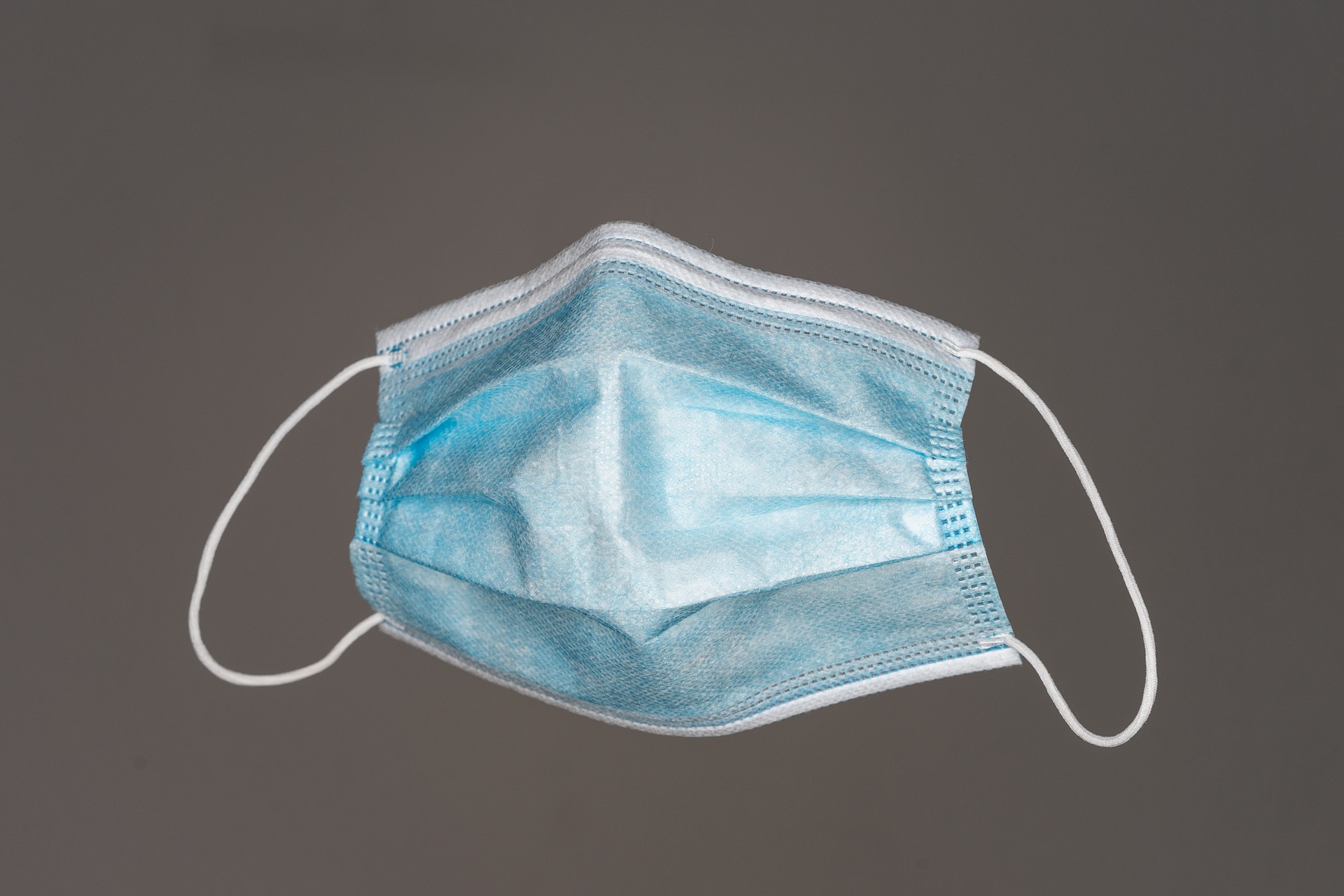
Instead of people clapping on balconies, I think Croatian healthcare workers would just prefer more general vigilance and personal responsibility – wear your mask, wash your hands regularly, no more parties in the basement. Clapping on balconies is a nice gesture, but ultimately it's an empty one.
How does it feel to know that there are some people out there, in every country, all around the world, who believe COVID is a hoax, or a plot, or not so serious, or that the vaccine is dangerous or something other than what it is?
Well, it's not always the content of the conspiracy theory that appeals to these people as much as it is their inability to accept facts – the truth – because they have little faith in the authorities that are telling them this. Here in Croatia, I think that distrust is quite high – a lot of people are disillusioned with the state and politics, because of corruption. Sometimes over 50% of the population choose not to vote. The dissemination of misinformation over social media doesn't help - if that's where people get their news from. If you look at that example from your own country, where strict measures about movement were put in place by your government, and immediately afterward, the Chief Advisor to the Prime Minister, was caught breaking them to travel across the country with his family to a second home in the countryside, going out on day trips. And he was defended by his colleagues after he was found out! When people see those kinds of things happening, the distrust between people and the authorities just grows.
All of the images in this article are used as illustrations only. None of the places or people depicted are in Croatia or Croatian, except for the first image, a panorama of Zagreb
Headquarters Announce New Measures in Croatia: Ban on Inter-County Travel, New Rules for Christmas Mass
December 18, 2020 - The National Civil Protection Headquarters announced new measures in Croatia at the 11 am press conference on Friday.
Index.hr reports that in the last 24 hours, Croatia has recorded 3,222 new cases, and the current number of active cases is 21,297. 10,478 people were tested in the last 24 hours; there 310 new patients in the hospital. Compared to yesterday, there are 29 new patients on ventilators. 68 people died.
“The seven-day incidence per 100,000 inhabitants in the Republic of Croatia is 591.1. The highest is in Međimurje County, then Zagreb County, and the lowest in Dubrovnik-Neretva and Istria. Within the 14-day incidence rate, Croatia is in 25th place. Luxembourg and Lithuania are higher,” said Krunoslav Capak at the start of the press conference.
After Capak, Minister Vili Beroš took the floor: "Within the current knowledge, those who have already had coronavirus and currently have immunity will probably not get sick in the coming period. However, due to the presence of the virus, they can transmit it and infect other people. This is very important because even those who have survived can transmit the disease to others.
The virus has condemned us to togetherness, and in the context of measures, we must think of each other. Wearing masks is essential, as is vaccination. To achieve collective immunity, we need to talk about it because with the vaccine we are not only protecting ourselves but for others as well.”
Davor Božinović continued: "It is great to talk about the start of vaccination, but it is a process that will continue throughout the next year. We will be able to breathe a sigh of relief in the next six months if responsible. That is why we made several decisions until January 10, 2021. We are trying to send a message about how important it is to calm the population and discourage socializing in this risky period. It is a combination of measures of the Headquarters and other government activities," said Bozinovic, before introducing the measures.
"First, there is the beginning of school holidays, allowing students to go on vacation until January 18. The movement and number of people in public transport will thus be reduced," Bozinovic said. He added that the government will hold talks with the Croatian Chamber of Commerce on Wednesday. The initiative is for workers to use old vacations during Christmas and New Year decisions.
Two decisions have been made; one is the extension of measures with some changes.
"On Christmas Eve and Christmas, mass will be held according to the special instructions of the CNIPH, with one believer per 7 square meters of the church instead of 25 people, regardless of the church's size.
The rule of one person per 7 square meters is also introduced for cinemas, theaters, and other places that belong to the domain of culture.
It is forbidden to leave the county in which the person resides. This does not apply to emergency activities and supplies, daily migration, security services, pharmacy delivery, journalists, patients requiring medical purposes, commuting to and from work if necessary and cannot be done from home, emergency persons preventing the spread of COVID-19, and diplomatic staff.
This is not the introduction of passes; this is a travel ban. Passes are issued only in exceptional cases, when necessary. The message is that everyone refrains from traveling, visiting, and contact for the holidays. The intention is not to extend the restriction of movement after January 8," Bozinovic said.
"It is important to reduce work activity. It is not very high at this time of year anyway, but there are exceptions, so there is a possibility of passes for exceptional cases. We appeal to everyone to refrain from traveling and gathering and socializing for two weeks," said Bozinovic.
NEW EPIDEMIOLOGICAL MEASURES - from midnight on December 22 to January 10
School holidays
- Students are on holiday until January 18, which reduces student mobility and public transportation
Vacations
"On Wednesday, a meeting was held with representatives of the economy. The next two weeks, December 23 - January 8, to enable the use of annual leave to reduce the number of infected people further. Representatives of the largest trade union centers that support this initiative were also introduced," Bozinovic said.
Private gatherings and ceremonies
- maximum of 10 people
- maximum of 2 different households
Mass
- when possible, via radio, TV programs, and otherwise
- exceptionally on December 24 and 25 according to special recommendations of the CNIPH
Professional and artistic performances
- the number of persons present is limited due to the size of the space
- at least 7 square meters per person
Ban on inter-county movement, from December 23 to January 8 (TCN has more on this HERE)
- it is forbidden to leave the county in which the person has a permanent or temporary residence. This does not apply to staff necessary for traffic maintenance, daily migration of employees in health care services, pharmacy delivery, utilities, gas and electricity supply, security services, journalists, patients, travel to and from work, emergency services to help prevent the spread of disease and diplomatic staff
- when entering/leaving the county, the measure should be adhered to, and you should have an identification card proving your status or pass
- the pass is issued by the county headquarters
- does not apply to the City of Zagreb and Zagreb County
- The travel ban enters into force on December 23 and lasts until January 8
Nove epidemiološke mjere od... by Tportal.hr
"We want to tell citizens to be patient through this risky part of the year without contact so we can wish each other all the best for the upcoming holidays. This is a time-limited decision and is not extended unless necessary due to the epidemiological situation. Around January 8, we will see the results of our behavior during the holidays."
As for people who have already paid for hotel accommodation or holiday home, Bozinovic said: "There are a number of justified reasons for issuing passes. These include people caring for the elderly, enforcing court decisions on the right to spend weekends with children, but also reservations for hotels and other accommodation until the day this decision takes effect. Those who have paid can keep their plan."
They also clarified measures related to churches. "HZJZ is preparing a special document for religious events. Every believer should have 7 square meters of space and there must be a notice at the entrance to the church," said Capak, adding:
"We will appeal to the church to ensure that the faithful monitor the implementation of the prescribed measures. As for the area in front of the church, the provision of a maximum of 25 people applies. In addition, it will contain recommendations members of the same household do not need to keep a distance. It is recommended to set up benches for believers from the same household and to have every other bench in use from the entrance to the altar."
Asked why catering facilities are not allowed to do the same, Capak said: "Because it is impossible. We persistently communicate that we are taking measures to reduce contacts so as not to ban certain activities that are necessary for economic and other reasons. This measure is related to respecting the wishes and needs of believers for spiritual peace and the need to celebrate the holiday. Religious celebrations are allowed with 25 people, but for Christmas Eve and Christmas we have allowed it to be with minimal epidemiological risk, so that believers can celebrate the holiday."
On the arrival of the vaccine in Croatia, Capak said: "We do not yet have any documents to know the exact quantities. The first symbolic delivery for all EU countries will be on December 26 and we will receive that quantity. We have Pfizer's promise to deliver the complete tranche by the end of the January. We will probably find out what the quantity will be at the beginning of next week."
More soon...
To read more about coronavirus in Croatia, follow TCN's dedicated page.
For the latest travel info, bookmark our main travel info article, which is updated daily.
Read the Croatian Travel Update in your language - now available in 24 languages.
Croatia is one of the Most Safe Countries in 2021 for Visitors
December 4, 2020 – Accepting all known knowledge of the Coronavirus risk and the announced vaccines, security and risk experts International SOS have published their latest, annual Travel Risk Map. It says Croatia is one of the most safe countries in 2021 for visitors
With the end of the life-halting Coronavirus in sight, thanks to several effective vaccines announced, which country would be best to visit next year? Well, Croatia is one of the most safe countries in 2021 for visitors.
It's been a long, difficult year for everyone. It's maybe hard to believe if you live in Croatia and haven't much travelled outside the country, but the residents of Croatia have had it no more difficult than anywhere else. With only around 4 million inhabitants, there's lots of space in Croatia to move around.
Take in comparison Britain's London. That one city (1,572 km²) alone has 9 million people. Croatia has 56,594 km² for less than half the number of people. But, this generous amount of space in which to move around is not the only reason Croatia is one of the most safe countries in 2021 for visitors.
On 2 December 2020, Total Croatia News published the annual report based on the Global Terrorism Index, identifying Croatia is one of the most safe countries in 2021 in regards to the absence of terrorist threat and effect. Now, according to the latest annual Travel Risk Map, it has been designated that Croatia is one of the most safe countries in 2021 for visitors.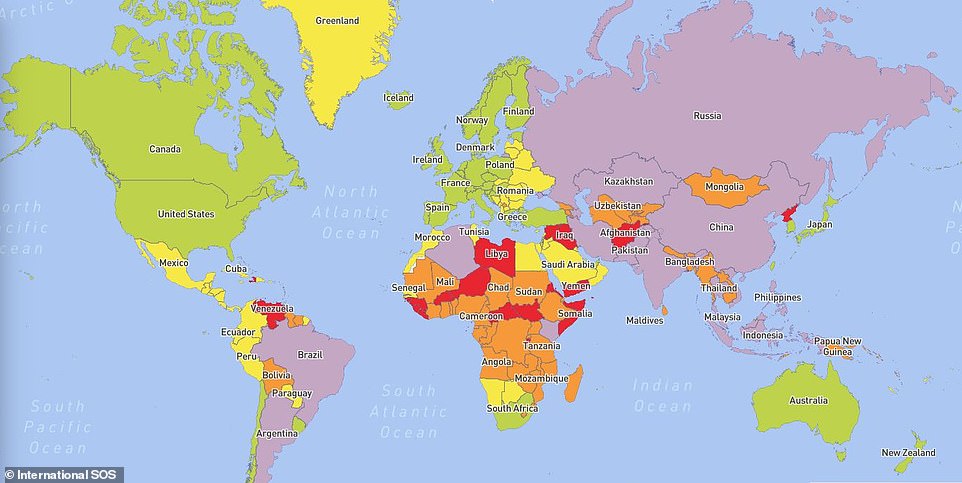 Security and risk experts International SOS's Travel Risk Map for 2021.
Security and risk experts International SOS's Travel Risk Map for 2021.
The map, created by security and risk experts International SOS , ranks the safety of countries across the globe taking into account medical, security and road risks. It assesses the risk of political violence, social unrest, and the threat of violent and petty crimes – and, most importantly this year, the impact of the pandemic.
For the first two categories, countries are given a rating out of five, while road safety is rated out of four based on the mortality rate per 100,000 people. The places with the highest risk level for security issues are mostly in Africa, with South Sudan, Mali, Yemen, Somalia and the Maiduguri region of Nigeria listed under the most dangerous, along with the Donetsk and Luhansk regions of the Ukraine.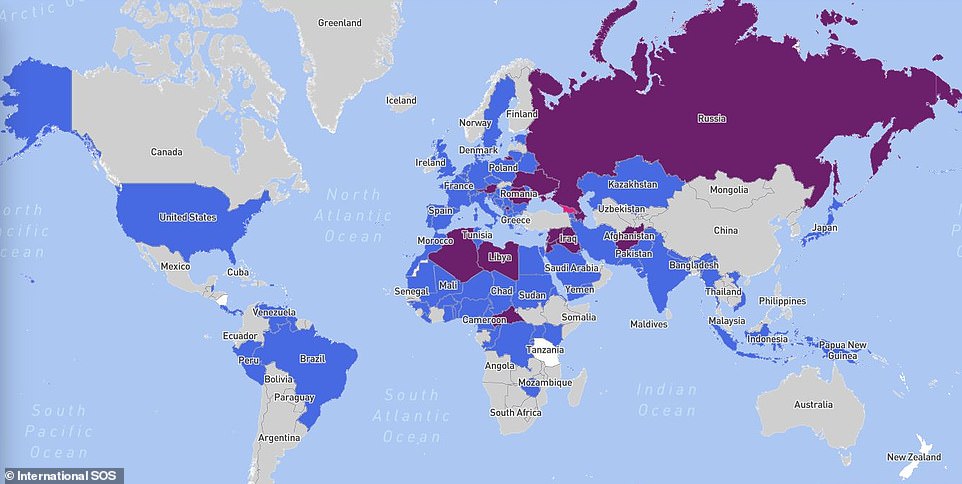 International SOS's map showing the countries with the most and least Covid-19 disruption. Very low-risk countries are marked in white, low risk in grey, medium in blue, high in purple and very high in pink.
International SOS's map showing the countries with the most and least Covid-19 disruption. Very low-risk countries are marked in white, low risk in grey, medium in blue, high in purple and very high in pink.
Very few countries rank above Croatia in the new safety map, New Zealand, Tanzania and Nicaragua among them, meaning Croatia is one of the most safe countries in 2021 for visitors.
For the residents of crowded cities elsewhere in Europe, Australia or the USA who have felt more than restricted in 2020, it might be worth remembering when planning next year's escape that Croatia is one of the most safe countries in 2021 for visitors.
Croatian Government Agreed on Fines for Violating Measures, Awaiting Parliament Confirmation
November 30, 2020 - At today's government session, which Prime Minister Andrej Plenkovic led from home in self-isolation, the fines for violating measures in Croatia were announced. They have yet to be confirmed by parliament.
Index.hr reports that Minister Beros read the proposal of new fines. Thus, a natural person can be fined HRK 500 for non-compliance with the prescribed measures, i.e. the obligation to properly wear a face mask or medical mask.
A fine of HRK 5,000 to 10,000 is prescribed for the owner of private property if they organize or allow a private gathering against the provisions of the law.
Bozinovic also announced new measures at the borders, and Maric, Aladrovic, and Coric presented new measures to help entrepreneurs.
In the beginning, Plenkovic expressed regret over the incident in Vukovar.
"As for the pandemic, the numbers are still high today. Unfortunately, 74 people have died, the most so far, due to the high numbers in recent weeks. We are still in a very serious phase of the epidemic, I call everyone to be responsible, so we have taken restrictive measures," he said.
He then said he would discuss amending the Infectious Diseases Protection Act so that fines for individuals could be defined.
"We have based our fight against coronavirus on trust between citizens and the state. We are convinced that most fellow citizens understand the circumstances, but we also think that such a tool is necessary given that certain irresponsible individuals endanger the health of others. That is why we will propose changes to the law to the parliament," said Plenkovic, who chaired the government session via a video link from self-isolation.
Furthermore, Plenkovic revealed details of new measures for entrepreneurs.
"The new package of measures to help the part of the economy whose activities have been suspended because of COVID-19 will amount to HRK 2.1 billion, and will include subsidies for salaries, fixed costs and COVID loans," said Plenkovic.
These measures, he said, are in line with the policy of preserving jobs in the private sector. He claimed that the government has so far preserved 630,000 jobs and helped 107,000 companies, paying a total of HRK 7.4 billion.
He announced the continuation of support of HRK 4,000 for workers' salaries during the suspension of operations, with the exemption from paying contributions. This is a total net amount of HRK 320 million, and when the contributions are added up, it is HRK 470 million.
The government will also cover part or all of the fixed costs during the suspension of the sectors affected by the measures, if their turnover in December falls by at least 60 percent compared to last December. According to government estimates, the measure should cost HRK 250 million. In addition, he added, in cooperation with HAMAG-BICRO, a new package of COVID loans was prepared in the total amount of HRK 1.3 billion.
"We base our support for the private sector on these three points, i.e., those affected by the anti-epidemic measures currently in force. All in all, the package will amount to HRK 2.1 billion," Plenkovic said.
"In this way, the government meets the needs of the economy, entrepreneurs and employees and strives, as before, to help citizens, the economy and entrepreneurs in the very specific year of 2020," he added.
Minister Beros read the statistics on the number infected.
"The Ministry of Health called on the Headquarters to submit amended plans for the care of people suffering from COVID-19, as well as a notification on additional care," Beros said.
“Everything we do will not yield results if the personal responsibility of each individual remains,” he said, adding that the HQ’s measures are there for a reason.
Bozinovic reiterated the latest measures taken this weekend.
"As far as supervision is concerned, inspectors and the police have made over 4,000 inspections, they have issued 605 warnings. Forty-four misdemeanor orders have been or will be submitted," Bozinovic read.
"A new decision has been made on border crossings, and it is tied to European regions. Passengers coming from EU green areas do not need a PCR test or any other condition to enter Croatia. All others need a negative PCR test that is not older than 48 hours or are tested on arrival in Croatia and in self-isolation to await the test result.
But at the moment, the only green region in the EU is the island of Fasta in Finland," Bozinovic said.
“As for third-country nationals, they can cross the border with a negative PCR test,” he said. "EU citizens coming from third countries can enter Croatia with a negative PCR test," Bozinovic added.
Entry without a negative PCR test for EU citizens is allowed, for example, for seafarers and workers in the transport sector, transport providers, diplomats, staff of international organizations, persons traveling for urgent reasons, passengers in transit with the obligation to leave the country within 12 hours and patients traveling for necessary health reasons.
Border health workers, pupils, students and interns who travel every day do not have to have a negative PCR test, provided that they do not stay inside or outside Croatia for more than 12 hours.
Beros continued on fines for violating the measures.
"The bill prescribes a new security measure of the obligation to wear a face mask or medical mask properly, a ban or restriction on holding public events and gatherings, and a ban or restriction on holding private gatherings," Beros said at the government session.
The amendment to the law points out that according to the current course of COVID-19, the need to properly wear face masks or medical masks so as to cover the mouth and nose is unequivocally indicated, which reduces the possible risk of transmission. Proper use of masks is most important when people are indoors and when social distancing is difficult to implement or maintain.
The bill stipulates that the implementation of supervision over the application of safety measures for the protection of the population from infectious diseases is also carried out by police officers, inspectors of state administration bodies responsible for civil protection, inspectors of the State Inspectorate and inspectors of other state administration bodies.
Also, a fine for misdemeanors is prescribed for legal entities in the amount of HRK 10,000 to HRK 40,000 in case of non-compliance with measures prescribed by law, i.e., if they do not respect the ban or restriction on holding public events and gatherings or disrespect the ban or restriction on private gatherings.
A fine of HRK 5,000 to 10,000 is prescribed for misdemeanors of a responsible person in a legal entity, as well as craftspeople and natural persons who perform other independent activities.
For a misdemeanor of a natural person, a fine of HRK 500 is prescribed in case of non-compliance with the prescribed measures, or the obligation to properly wear a face mask or medical mask.
A fine of HRK 5,000 to 10,000 is prescribed for the private property owner if they organize or allow a private gathering against the provisions of the law.
Also, the provision on collecting fines at the place where the misdemeanor was committed is changed in accordance with the provisions of the Misdemeanor Law. Thus, the fine may be collected at the place where the offense was committed by a person authorized to supervise the implementation of safety measures to protect the population from infectious diseases.
To read more about coronavirus in Croatia, follow TCN's dedicated page.
Stricter Measures in Croatia Today, What Can We Expect?
October 12, 2020 - The Croatian Civil Protection Headquarters should announce stricter measures in Croatia during a press conference at noon on Monday as the country registers a record number of coronavirus cases.
Index.hr reports that Croatia has seen a record number of new coronavirus cases for days. The highest daily number of new cases since the beginning of the epidemic happened on Thursday when there were 542 cases. There were 457 on Friday, 486 on Saturday, and 508 on Sunday.
The National Civil Protection Headquarters will hold a press conference today
On Monday at noon, the National Civil Protection Headquarters will hold a press conference.
It is expected that new, stricter measures will be presented. Judging by the statements of the leaders of the Headquarters so far, it is almost certain that the measures will not be adopted for the entire country, but locally, depending on the epidemiological situation.
The worst is in Zagreb and its surroundings
Both Zagreb and Krapina-Zagorje counties have recorded negligible daily numbers of new infections. In Krapina-Zagorje County, there were 25 cases on Friday, 16 on Saturday, and 81 on Sunday. As for Zagreb County, there were 53 on Friday, 41 on Saturday and 25 on Sunday.
As is clear from the above figures, the spread of coronavirus is the worst in Zagreb and the surrounding area. There were 126 new cases in the capital on Thursday, 161 on Friday, 199 on Saturday and 201 on Sunday, the highest daily number of new infections in Zagreb since the epidemic began.
The Zagreb Headquarters announced stricter measures all weekend
The director of the Teaching Institute for Public Health "Dr. Andrija Štampar" Zvonimir Šostar, as well as his deputy Sandra Šikić, have been announcing for days that they will ask the National Civil Protection Headquarters to introduce new, stricter measures next week.
It should be noted that the National Civil Protection Headquarters generally approves all requests from local headquarters, so it would be extremely unlikely that it would reject the requests of the leaders of the Zagreb Headquarters. Recall, this was also the case when the Split-Dalmatia County Headquarters demanded the closure of gyms and fitness centers with, to put it mildly, deficient arguments.
What measures will be introduced in Zagreb?
According to Zvonimir Sostar, several stricter measures would be introduced in Zagreb this week.
Among them, the obligation to wear protective masks in all closed, but also some open spaces, stands out.
"We will go next week with a proposal to limit the working hours of all restaurants until midnight at the most. What we will obviously have to do and what awaits us - and in Italy, it is proving to be an outstanding example, is the mandatory wearing of masks, not only indoors but also in open spaces," Sostar said on Saturday, and he clarified that the obligation to wear masks outdoors will apply to spaces where it is impossible to ensure that the recommended distance of two meters is maintained.
Something similar was repeated by Sostar's deputy Sandra Sikic.
"Common sense dictates that if you can't keep your distance, put on a mask," said Šikić and expressed her belief that wearing a mask would not be a motive for fellow citizens to avoid punishment, but infection and to protect the health of loved ones.
Sostar first asked for penalties for not wearing masks, and then changed his mind
Although Šikić says that he is against being punished for not wearing masks, her boss said two days ago that he would fine 300-400 kuna for not wearing masks.
In some European countries, not wearing masks is already fined, but neither the National Headquarters nor the local headquarters, with the exception of Sostar from the Zagreb headquarters, have so far demanded penalties for non-compliance with the obligation to wear masks.
It is interesting that Šostar changed his mind and referred to the mayor of Zagreb and the multiple USKOK indictee Milan Bandić.
"It is certain that there will be no punishment, I spoke to the mayor and he accepted that for his fellow citizens," Šostar said in an interview with RTL on Sunday night.
"Epidemiologists are running out of energy"
"The numbers are such that we should be worried. But I believe that the number will be lower on Monday. Epidemiologists and all of us are running out of energy and I believe that we will get serious and start adhering to the measures prescribed by the National Headquarters," Šostar added and announced that he would recommend stricter controls on youth gatherings, such as the one in front of the Croatian National Theater in the center of Zagreb.
"We will recommend that it be controlled by the police and Civil Protection," Šostar said.
When will the new measures take effect in Zagreb?
The National Headquarters devised new measures over the weekend. There are no concrete decisions yet and it is likely that, at least as Šostar claims, they will monitor the daily number of new infections in the coming days before the final decisions are made. It is certain, therefore, that the new measures will not take effect on Monday.
"The last agreements will be made before the Headquarters on Monday. It is recommended that the working hours for all clubs, cafes and restaurants be moved to midnight. I remind the clubs that working hours are already limited until midnight by the decision of the National Headquarters," Šostar said.
Why is the obligation of masks introduced indoors, but also in some open spaces?
On Friday, Index spoke with Minister Vili Beroš about introducing mandatory masks indoors, but also in some open spaces.
"Keeping a physical distance is extremely important to control the spread of infection. As with most respiratory infections, the only sure way to avoid infection is to avoid contact with an infected person. However, there are many situations where keeping a physical distance is not possible," the Minister of Health said.
"In such situations, wearing a mask is not a protection for the person wearing the mask, but it reduces the possibility of spreading the indection if it is worn by an infected person. For this reason, the obligation to wear masks is already prescribed in many enclosed spaces, for example in public transport and in shops, both in Croatia and in other European countries. Indoor masks are being considered because the spread of the infection has been noticed in many workplaces among colleagues who are in close contact, for example sharing the same office, and who have not been able to keep physical distance," Beros told Index.
Many European countries are introducing stricter measures
Many European countries have been recording record daily numbers of new infections in recent days, which is why they are introducing new, stricter measures.
In Ireland, 1,012 new cases of COVID-19 were recorded on Saturday, the largest increase in the number of new cases in one day since the start of the epidemic and almost twice the average of last week. The Irish government closed restaurants across the country last Monday and limited the number of visitors to nursing homes.
For the first time since the start of the epidemic, the number of new cases in France was higher than 26,000 on Saturday. On Sunday, measures came into force that provides for the closure of all bars and stricter health protocols in restaurants.
Slovenia currently has over 3,000 active cases of coronavirus infection, 149 patients with COVID-19 are in hospitals, of which 21 are in intensive care, and 167 people have died as a result of the infection so far. Due to the worrying epidemiological situation, the Slovenian government this week introduced a ban on gathering more than ten people in public and private spaces, and restricted work and prescribed conditions for restaurants and catering facilities.
In the Czech Republic, COVID-19 is spreading rapidly, and 8618 new cases were recorded on Saturday. They registered four consecutive days with record numbers, with an increase of about 3,300 new infections compared to the day before. As of Monday, all theaters, cinemas, museums, galleries and sports facilities will be closed for two weeks to stop the spread of the coronavirus.
Italian authorities reported 5372 new cases in the last 24 hours on Saturday The Italian government is considering introducing additional measures against the spread of coronavirus, but without returning to full lockdown. The new law would ban gatherings in front of bars and restaurants. The government is still debating the proposal, but the new rules are expected to be presented by Thursday.
For the latest travel info, bookmark our main travel info article, which is updated daily.
Read the Croatian Travel Update in your language - now available in 24 languages.
Join the Total Croatia Travel INFO Viber community.


